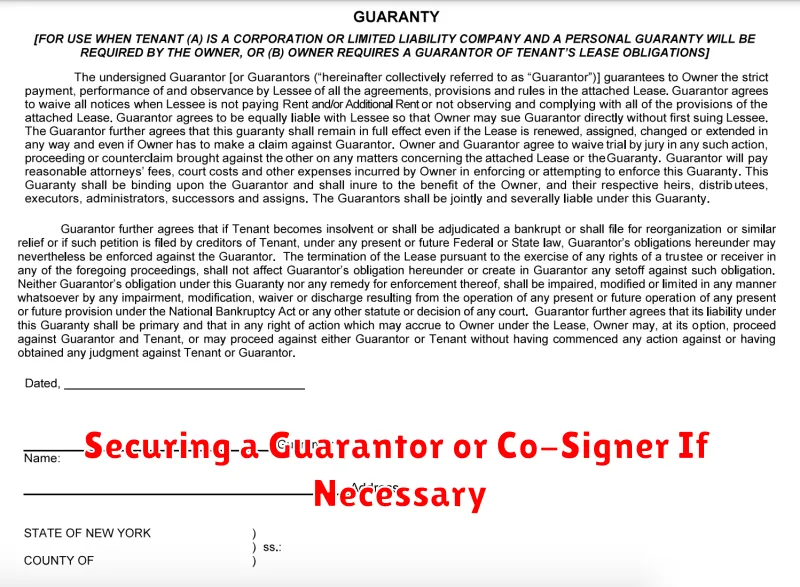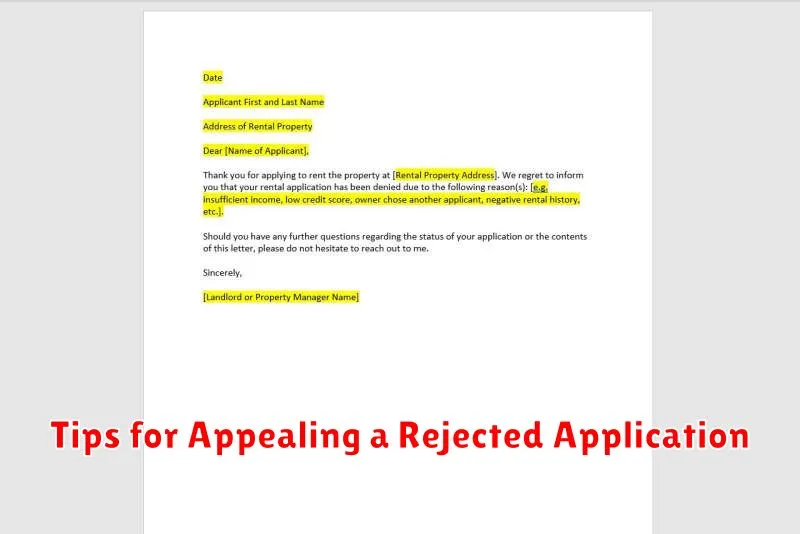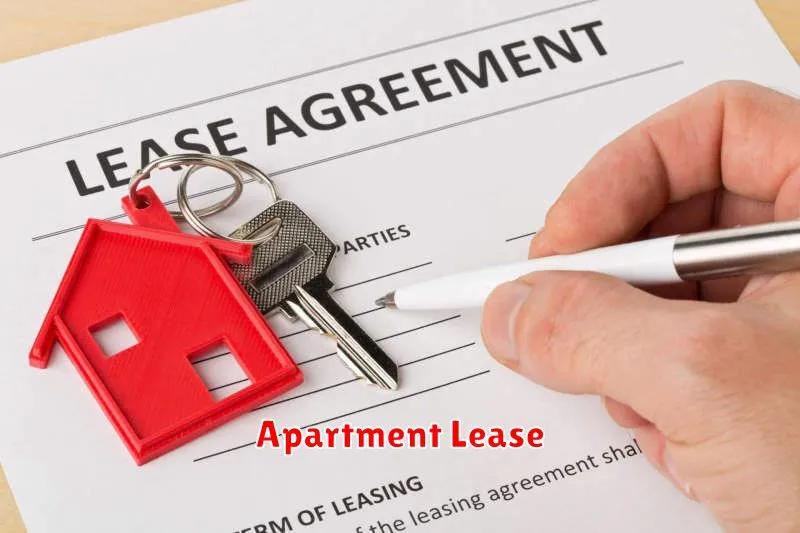Are you searching for a new apartment and wondering how to speed up the approval process? Getting approved for an apartment lease can sometimes feel like a long and arduous process. It’s stressful enough moving to a new place without the added worry of not getting approved for your dream apartment. Fortunately, there are steps you can take to increase your chances of getting approved quickly. This article will cover essential tips to help you navigate the apartment application process, including improving your credit score, understanding your income requirements, and showcasing your rental history. By following these suggestions, you can improve your chances of a quick and successful lease approval.
Understanding the Application Process
Getting approved for an apartment lease quickly requires understanding the application process. It typically involves submitting a rental application, providing supporting documentation, and passing a background check. Each step plays a vital role in determining your eligibility for the apartment.
The rental application is a form that gathers essential information about you, including your personal details, employment history, and previous rental history. This form allows the landlord to assess your financial stability and responsible tenancy track record. Be sure to fill it out accurately and completely.
Following the application, you’ll need to provide supporting documentation, such as pay stubs, bank statements, and letters of reference. These documents verify your income, creditworthiness, and overall financial reliability. By presenting solid proof of your financial capacity, you increase your chances of securing the apartment.
Finally, the landlord will conduct a background check to verify the information you provided on the application. This typically includes a credit check, criminal background check, and sometimes a rental history check. A clean background check is crucial for approval, as it demonstrates your trustworthiness as a tenant.
By understanding these steps and preparing the necessary documentation, you can significantly improve your chances of getting approved for an apartment lease quickly.
Boosting Your Credit Score for Rental Applications
Your credit score is a critical factor in determining whether you’ll be approved for an apartment lease. Landlords often use credit scores to assess your financial responsibility and ability to pay rent on time. A higher credit score increases your chances of getting approved and may even make you eligible for better deals, such as lower security deposits or waived application fees.
To boost your credit score for rental applications, focus on these key areas:
- Pay your bills on time: This is the single most important factor in building a strong credit score. Set up reminders or use autopay to ensure timely payments.
- Reduce your credit utilization: Keep your credit card balances low, ideally below 30% of your available credit limit.
- Don’t apply for too much credit: Each credit application results in a hard inquiry on your credit report, which can temporarily lower your score. Avoid unnecessary credit applications.
- Dispute any errors on your credit report: Check your report for mistakes and file a dispute with the credit bureaus if you find any inaccuracies.
- Consider a secured credit card: This type of card requires a security deposit, which can help build your credit history.
By taking these steps, you can improve your credit score and increase your chances of getting approved for an apartment lease quickly. Remember, a good credit score is a valuable asset, not only for renting but also for other financial endeavors in the future.
Showcasing Your Income and Employment Stability
Landlords want to see that you can afford rent and that you’re a reliable tenant. One of the best ways to showcase this is by providing documentation of your income and employment stability. This can be done by:
- Providing a recent pay stub showing your current income.
- Submitting a letter of employment from your employer confirming your position and salary.
- Sharing bank statements that demonstrate a consistent income stream.
If you’re self-employed, you can provide tax returns or financial statements to prove your income. A strong credit score also demonstrates financial responsibility and can increase your chances of approval.
By proactively demonstrating your income and employment stability, you increase your chances of securing your dream apartment quickly and efficiently.
Providing Strong References and Rental History
A strong rental history and references are crucial for getting your apartment lease approved quickly. Landlords want to ensure that you are a responsible and reliable tenant. This means showing that you have a track record of paying rent on time and taking care of the property.
To provide strong references, you should gather contact information from previous landlords. Landlords are typically happy to provide a reference for a tenant that has been reliable. If you’ve had a positive relationship with your previous landlord, they should be willing to provide a favorable reference for your new lease application.
In addition to providing contact information for past landlords, be prepared to provide any other documentation that shows your strong rental history, such as lease agreements or pay stubs. Be sure to organize your paperwork for easy access during the lease application process.
It’s also helpful to consider providing a personal reference. This could be a close friend or family member who can vouch for your character and reliability. Be sure to get permission from anyone you use as a reference.
Preparing a Compelling Application Package
When applying for an apartment lease, you want to present yourself as a reliable and responsible tenant. A strong application package is crucial for quickly securing your dream apartment. Here’s how to make your application stand out:
Complete and Accurate Information: Begin by filling out the application form completely and accurately. Double-check for any errors or omissions, as inconsistencies can raise red flags for landlords.
Solid Credit History: Your credit score plays a significant role in the approval process. A good credit score demonstrates your financial responsibility. If your credit score is less than ideal, consider providing a letter of explanation outlining any challenges and your plan to improve your credit.
Proof of Income: Landlords want to ensure you can afford the rent. Provide pay stubs, bank statements, or other documentation that clearly shows your income source and amount.
Rental History: If you have a positive rental history, provide previous landlord references. These references can vouch for your responsible tenancy and on-time rent payments. If you’re a first-time renter, you can provide references from other landlords, such as your parents or previous roommates.
Positive References: Besides rental references, having strong personal references from employers, friends, or family members can boost your application. These references should be individuals who can attest to your character and trustworthiness.
Pet Information: If you have pets, be prepared to provide documentation about their breed, size, and vaccination records. Some landlords may require pet insurance or additional deposits for pet-friendly units.
Early Application: Don’t wait until the last minute to apply. Submitting your application early can give you a competitive edge and demonstrate your genuine interest in the property.
By preparing a compelling application package that highlights your positive attributes, you increase your chances of securing an apartment lease quickly. Remember, a well-organized and informative package demonstrates your commitment to becoming a responsible tenant.
Communicating Effectively with the Landlord
Once you find a suitable apartment, it’s essential to communicate effectively with the landlord throughout the application process. Prompt, clear, and respectful communication demonstrates your responsibility and reliability.
Be proactive in reaching out with any questions you might have about the application, lease terms, or the property. Responding quickly to their requests for documentation, like income verification or credit history, can expedite the process.
During phone calls or emails, be polite and professional. Avoid using slang or casual language. A professional tone will leave a positive impression.
If you’re unsure about any aspect of the lease agreement, don’t hesitate to ask for clarification. It’s better to be clear than to assume and potentially encounter issues later.
By demonstrating effective communication, you show the landlord that you’re a responsible and reliable tenant, which can increase your chances of approval.
Negotiating Lease Terms and Conditions
Once you’ve been pre-approved for an apartment and are ready to sign the lease, don’t rush into it! It’s crucial to carefully review the lease terms and conditions and consider negotiating some aspects. This can save you money and headaches down the line.
Here are some key areas to consider negotiating:
- Lease Duration: If you’re planning on a shorter stay, inquire about shorter lease options. Landlords might be willing to accommodate if there’s a high demand for apartments.
- Rent: While rent is usually set, you might be able to negotiate a slight discount, especially if you’re signing a longer lease or making a larger security deposit.
- Pet Policies: If you have pets, discuss any potential pet fees or restrictions. In some cases, landlords might be flexible depending on your pet’s breed and size.
- Late Fees: Negotiate a grace period for late rent payments or a lower late fee. This can be helpful if you occasionally face unexpected financial challenges.
- Early Termination Clause: If you need flexibility, see if you can add a clause allowing you to break the lease early with a reasonable penalty.
- Utilities: Inquire about whether utilities are included in the rent. If not, see if you can negotiate a reduced rate or a specific payment plan.
- Parking: If parking is not included, explore the options and costs for parking spaces.
Remember to be respectful and polite during negotiations. Explain your reasoning for wanting to negotiate specific terms and be prepared to compromise. By being proactive, you can secure a lease that works best for you and your needs.
Securing a Guarantor or Co-Signer If Necessary

Sometimes, you may need a guarantor or co-signer to be approved for an apartment lease. This is typically required if you have limited credit history, low credit score, or a low income. A guarantor or co-signer agrees to be financially responsible for you if you fail to pay your rent.
When you’re looking for a guarantor or co-signer, it’s important to find someone with good credit and a stable income. You should also be sure to communicate with them openly and honestly about your financial situation and the responsibilities they will be taking on.
If you need to find a guarantor or co-signer, start by asking family members or close friends. You may also be able to find a professional guarantor service online.
It’s always best to be upfront with potential landlords and disclose that you’ll be using a guarantor or co-signer from the start. This can help to avoid any surprises or delays during the application process.
Understanding the Importance of a Background Check

A background check is a standard procedure that landlords use to verify the information you provide on your rental application and ensure you’re a reliable and responsible tenant. It is an essential part of the rental process, and understanding its significance is crucial to get approved for an apartment lease quickly.
Landlords conduct background checks to protect their investment and ensure the safety of their property and other tenants. By performing a check, they can assess your:
- Credit History: This reveals your financial responsibility and ability to pay rent on time.
- Criminal History: Landlords need to ensure the safety of their residents and property.
- Eviction History: Past eviction records indicate your rental history and ability to adhere to lease terms.
- Employment Verification: This confirms your ability to afford rent based on your income.
A thorough background check provides landlords with valuable insight into your reliability and potential as a tenant. It helps them make informed decisions and select tenants who are likely to fulfill their lease obligations. Remember, a clean background check can significantly improve your chances of getting approved for an apartment quickly.
Tips for Appealing a Rejected Application

Getting rejected for an apartment can be frustrating, especially if you feel confident in your application. However, don’t give up hope just yet. There are ways to appeal a rejected application and increase your chances of getting approved. Here are some tips:
1. Understand the Reason for Rejection: The first step is to understand why your application was rejected. Contact the landlord or property manager and ask for specific details. They may cite issues like low credit score, insufficient income, or a negative rental history.
2. Address the Issues: Once you know the reason for rejection, address it head-on. If it’s a credit score issue, provide documentation of recent improvements or offer a co-signer with good credit. If it’s income, consider offering a larger security deposit or a higher rent payment. Be prepared to provide supporting documentation.
3. Highlight Your Strengths: Even if your application was rejected, don’t forget to highlight your positive qualities. You can emphasize your strong rental history, stable employment, or your willingness to follow the lease terms.
4. Be Professional and Polite: When communicating with the landlord or property manager, maintain a professional tone. Be polite and respectful, even if you feel frustrated. This will make you seem more appealing and increase your chances of success.
5. Consider Alternative Solutions: If your appeal is unsuccessful, consider alternative solutions, such as finding a co-signer with good credit or offering a larger security deposit. You may also explore different properties that might be more flexible with your situation.
Moving in Quickly After Approval
Once you’ve been approved for an apartment lease, you’re probably itching to move in. There are several things you can do to speed up the process and get settled in your new place as soon as possible:
Be Responsive: The landlord or property manager will need to finalize paperwork, schedule move-in inspections, and possibly coordinate with other tenants. Respond quickly to emails, phone calls, and requests for information. This shows you’re serious about the lease and helps keep things moving.
Provide Documents Quickly: Gather all required documents (proof of income, credit reports, etc.) promptly. Delays in providing these will stall the process.
Be Flexible with Move-in Dates: If you are flexible with your move-in date, let the landlord know. They may have an earlier opening, making the process faster for you.
Ask About Move-in Procedures: Inquire about the specific move-in process: When can you access the apartment? Do you need to pay a security deposit? What are the key handover details?
Confirm All Details: Before you move in, double-check that all the details of the lease are correct and that you understand the terms. Ask any remaining questions you have.
By taking these steps, you’ll be well on your way to enjoying your new apartment in no time!

